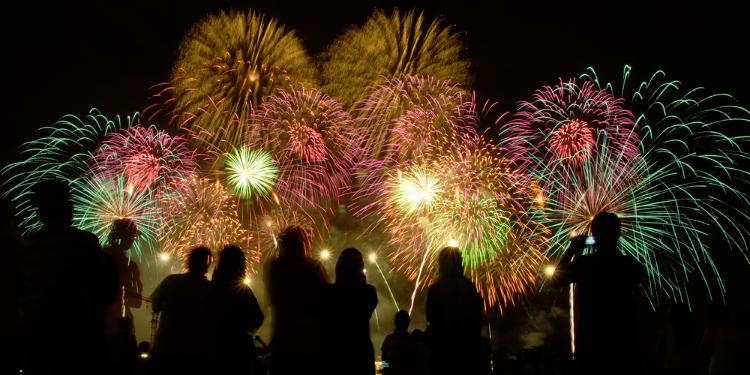Given the ecological impact, the suffering of animals, and the accidents caused by fireworks, many people question whether this habit, however colorful and fun it may be to start the year in style, should not be strictly regulated or even banned and replaced. So, are you for or against it? Here's what expats have to say.
In which countries are New Year fireworks the norm?
Many cities organize huge fireworks displays at the stroke of midnight on New Year's Eve, as is the tradition. These include the United States (with its famous fireworks display at New York's Times Square), France (at the Eiffel Tower), London in the United Kingdom, Sydney, Melbourne and Brisbane in Australia, Japan with its "Shinshun Hanabi Taikai" celebrations, and Rio de Janeiro in Brazil on Copacabana beach. Apart from the most famous ones worldwide, it's also the norm in many countries, such as Italy, Spain and the Netherlands.
However, there are rising concerns about the use and impact of fireworks, and some towns and cities have already decided to ban them, at least private fireworks displays, which often have the most significant impact and cause the most accidents yearly.
In some countries, drone shows are gradually replacing traditional fireworks displays. In 2020, for example, Shanghai stunned the world with its innovative idea of presenting a gigantic show featuring over 2,000 drones.
Why are fireworks subject to criticism?
Although fireworks are commonly used for major celebrations such as New Year's Eve, many people regularly warn of their potential danger and impact on flora and fauna.
The chemicals used in explosives can release harmful substances such as sulfur dioxide, nitrogen dioxide, and fine particles into the atmosphere, affecting air quality. Moreover, residues from fireworks displays, such as shells, ash and other debris, fall back onto the ground and into the water. If improperly collected, this could lead to soil and water pollution, particularly if the residue contains harmful chemicals.
They can also disturb wildlife, notably birds' habitats, disrupting their sleep cycles or causing frightened flights. Pets, such as dogs and cats, can also be affected. They may experience stress and anxiety due to fireworks and react erratically, including running away and putting themselves in dangerous situations.
Are expats for or against New Year fireworks?
How do expats really feel about this practice? Do they like it? Do they support it or not?
Riccardo, an expat in Dublin, Ireland, returns to Italy almost every year for the holidays, particularly New Year's Eve, when fireworks are part of the local custom. "I love fireworks. I understand people who are against it for various reasons. But I would find it dull to celebrate New Year without them. Individuals can buy and light them in their garden or terrace in my locality and hometown. I purchase a few myself with a friend; it's almost like an annual tradition. Truly, the sight is amazing from the town's highest points; dozens of bonfires are lit everywhere, creating a lovely and joyous atmosphere. I have yet to celebrate New Year's Eve in Dublin, but I hope that when I do it, I'll be able to see some fireworks."
Estelle, a French expat in Italy, has mixed feelings on the subject. "I love fireworks. I've always loved them, and I'm used to them. But I have to admit that from an environmental point of view, it's really not that great. What's more, the waste is often very badly collected, especially from people's houses, not to mention the accidents! A few years ago, I was too close to a firework display in a friend's garden at midnight, and I caught a spark on my cheekbone - a few centimeters more, and it could have landed in my eye. I can't imagine what would have happened. It left a scar, a red dot that wouldn't go away for 2 or 3 years."
Estelle thinks it's important that people ask themselves whether fireworks are really useful and whether the damages can be limited. "We're talking about and seeing more and more lighted drone shows, which aren't really the same thing, but they have the advantage of being noiseless and don't smell bad! I must say, it's a pretty good substitute."
Laura, a Spanish native from Madrid and currently living in the Netherlands, also shared her feelings with us. "Unfortunately, it's common practice not only in my birth country but also in Amsterdam, where I currently live. I'm not against fireworks; I know they can be fun, but I'm really for the ecological and animal causes, and I know the effect of fireworks on animals and other aspects, so I don't really support or like them for those reasons. I believe there are other enjoyable ways to celebrate New Year."
For Oli, an expat from the Dominican Republic who has been living in the Netherlands for a few years with her husband, fireworks are a normal thing. "In my home country, they are popular not only at the end of the year but for all occasions (birthdays, weddings, any celebration). It's very easy to purchase, as long as you're over 18. Initially, especially when I was a child, I used to love it because it was beautiful. It was representative of a real celebration, and my family loves it." But when she moved to Europe, she became more aware of certain things and how they can affect not only the planet and the animals but also people who can get hurt. "In my case, it's mainly about animals. Since I realized that in the last decade or so, I no longer favor fireworks, and I avoid seeing them as far as possible. I'm in favor of alternatives that are more respectful of the environment and animals and that don't cause harm to any human or animal."
















